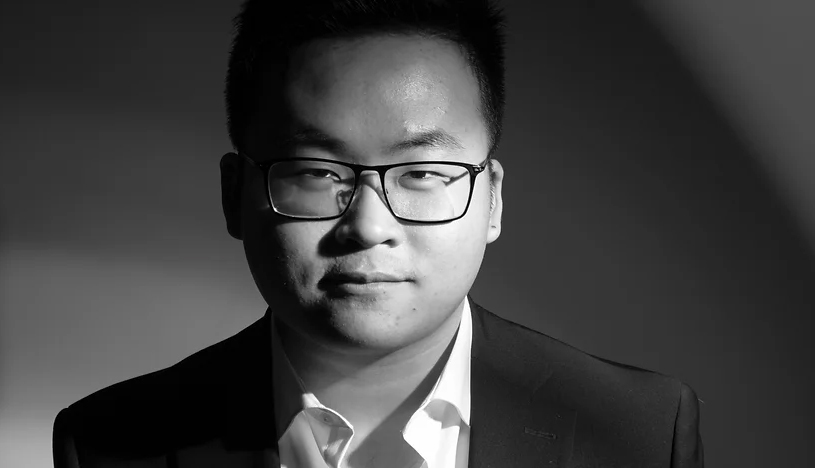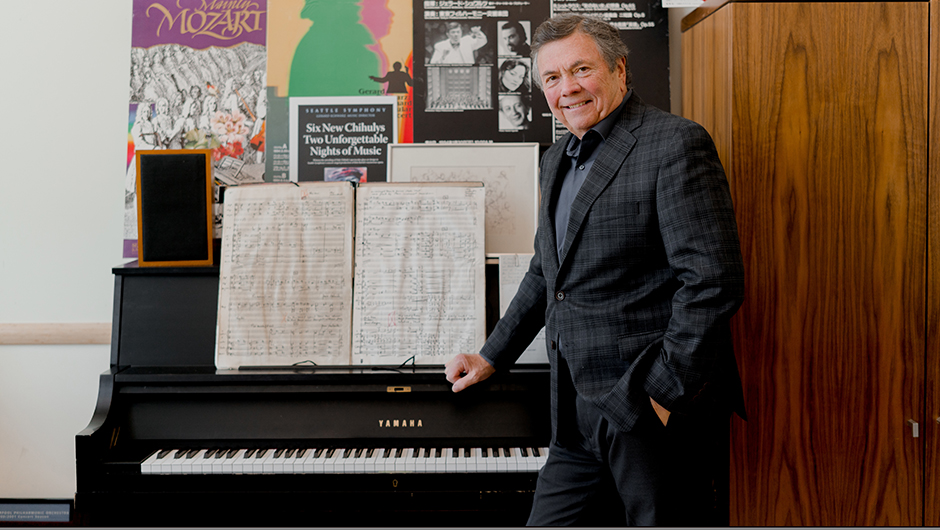In the last four years as music director of the Frost School Symphony Orchestra, Gerard Schwarz has cultivated a cognate at Frost. Here, the lessons students learn are about ‘the music’—how to become a better musician, artist, and musical ambassador of the 21st century.
“Times have changed for the classical musician, and so has the profession of conducting,” says Yun Xuan Cao, a master’s student in Music Instrumental Conducting and a teaching assistant for Master Schwarz, as he respectfully calls his teacher. “He teaches and inspires us to approach this career in many ways. And it’s not just about standing on the podium to conduct. It’s about all the mysterious work that goes behind the baton.”
In a more mundane way, conductors might be comparable to the musical equivalent of sports team managers. You can’t measure exactly what they do, but you know the caliber of what they do when you see it on the field or court. Or, as in this case, when you hear the right tempo.
The nature of the conductor has shifted and changed since Toscanini or Bernstein; Cao learned. To enter this profession today, it’s not enough to arm yourself with a sliver of wood or just rely on your hands to keep the sonic output of several instrument-wielding people and deliver an artistic experience that nobody can forget.
“I’m a conductor,” says Schwarz. “I wave my hands. Of course, that’s what we do. But what we really do is study the music in depth. Our program studies music history and how the pieces are performed—I, we, and others. We expose ourselves to this big canvas of classical music and try to understand it.”
As a conductor, Schwarz digests it all to find his way within that realm. As a professor, he knows it will be different for any two people. For example, if one of his students says, “How do you become a conductor?” Schwarz will tell him how he did it, but he won’t expect his student will do it the same way.
“We have a remarkable group of musicians here at Frost,” says Schwarz. “Yun is doing some study work with Amanda Quist, Director of Choral Studies. Her choral students have studied with me. One of our band conductors has also taken lessons with me. It’s what we call a cognate.”
The idea is for programs to support each other by creating a similar platform upon which their students can learn and train. “Yun and Amanda are working on Brahms Requiem, a German composition,” he says. “She has prepared it many times for the Philadelphia Orchestra and other orchestras and has an insight different from mine. Not better or worse, just different. And that’s what we try to do at Frost.”

Yun Xuan Cao
If you watch Cao or any of Schwarz’s other current conducting students like Alberto Bade, Sophie Mok, and Carlos Lopez, they all conduct very differently. Schwarz prepares them for what he calls, ‘the end game.’ What do you want to do? Schwarz asks them. Do you want to be the music director of the Baltimore, Houston, or Boston Symphony? Or do you want to be the music director of the Frost Symphony Orchestra?
Whether students want to be in a symphony or a producer of music recordings, or an educator, Schwarz teaches them how to be ready for any of those professions. They start by working on the basic musical ideas so that everything they do can be transferred to everything else they will do in life and in their music careers. The focus is on growing and having more knowledge of the repertoire and the orchestra—of what works and doesn’t work in today’s classical music industry.
“The industry today is completely different,” he explains. “And quite frankly, I would say, in general, better now than then. When I was growing up, there were the five great orchestras— Boston, Chicago, Cleveland, New York, and Philadelphia—and everybody else was secondary. That’s not true anymore. San Francisco and Los Angeles became part of that group shortly after, and it was seven. Then the group became based on budget size, not on artistic achievement. And now, every reasonable-sized city in our country has a good orchestra, and each can sound as good as any other on a given night. So, the whole level has risen tremendously. Because of that, musicians can make a career in Minneapolis, Milwaukee, Houston, Dallas, Seattle, or in Portland. They don’t have to move on to the next level.”
Miami is missing from that group, and that’s because, as great as the city is, it’s one of the few major cities in the country without a major orchestra.
“We were also very single-minded,” continues Schwarz. “If you failed to play piano concertos or get first oboe position in an orchestra, you would often go into a different profession. Nowadays, the music industry is a broad world, and Frost offers students an opportunity to be exposed to all those worlds.”
Now, to be successful in those worlds, rehearsals are key. That’s true for any conductor, especially for students learning their steps—from rehearsal to performance. How is it going to grow? What needs to be fixed? What will fix itself? What do you have to do to inspire the musicians? Everyone has different things, Schwarz admits.
For some conductors, he says, they focus on how their faces or hands look, the words they choose to correct or guide the musicians, or the pieces they pick that perhaps the musicians don’t like.
“It’s a lot about attitude,” he says. “Most Frost students have a fantastic attitude. They like taking risks and following your lead. And on the other hand, whatever decisions I or any of my assistant conductors make, we expect a high level of performance from them.”
“Every decision needs to be a musical one,” adds Cao. “I learned that from Maestro Schwarz. When I’m 70 years old and look back to my studies with him, that’s the mantra I will remember. As a leader, you are here to inspire, encourage, and motivate people you come across—whether they are musicians or not. As a conductor, you must prioritize the music and place musical integrity and commitment to the highest musical excellence first in everything you do. That is key for success in our world.”
True masters learn from their students, as Schwarz attests. “Yun has a natural musical gift and an incredible gift for managing time and people. As conductors, we need both of those things. Being efficient is part of being an artist. I’ve learned an incredible balance of art and work ethic from Yun.”

